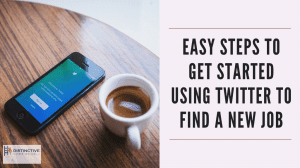
Do you Tweet? If not, maybe you should, especially if you are trying to find a new job.
Perhaps it would be misleading to say that as a job searcher you MUST be on Twitter, LinkedIn, Facebook, or other social and business networking sites. But, assuming that you use social media in appropriate and professional ways, being connected and networking in these ways can only help when you are trying to find a new job.
And, few people would argue that you shouldn’t seize on any edge that you can give yourself in a job market that is widely being called the most competitive in a quarter-century.
Twitter, for those unfamiliar, is a service that allows you to communicate and stay connected with your colleagues, current and former co-workers, friends, family, and other contacts through the exchange of quick, simple answers (140 characters or less) to the question, “What are you doing now?”
While the premise is simple-so simple that you might at first question how “Tweeting” (Twitter-speak for posting an update to Twitter) could be helpful in your job search-I would urge you to take another look.
Twitter has become vastly popular and you might be surprised at how many of your colleagues, friends, and even top experts in your field or profession are on Twitter.
If you are actively involved with managing your career or conducting a job search, here are just a few benefits that will justify the time you spend setting up your free Twitter account and learning how to use it:

1) Twitter can be a great tool to help you build, enhance, and promote your personal brand. Briefly, your personal brand (as it relates to your career) is what differentiates you and makes you and your contributions uniquely valuable in the workplace.
When you are trying to find a new job, you can use Twitter to make your followers aware of your expertise, post links to interesting news stories about your industry, or post tips related to your profession.
All of these are brand-building activities that will make you memorable to your contacts, boost your credibility, and help set you apart as a leader in your field.
2) Twitter is an extraordinary networking tool. Remember that networking is all about building relationships. Twitter helps you stay in contact with people in your network in a quick and easy way that was never before possible.
It will allow you to keep your contacts up-to-date on your job search, it is a great way to learn about unadvertised job openings, and it is often an easy way to get referrals to people you should talk to.
Of course, it is important to remember that networking is also about providing reciprocal help, and Twitter allows you a fast, easy way to let people in your network know about job openings you’ve heard about, or give other help or advice to your contacts when they need it.
3) Twitter provides you with a way to connect almost instantly with recruiters and other hiring authorities in your field. More and more recruiters are using Twitter and other social media tools to find candidates for job postings. Some companies are actively encouraging their employees to Tweet about (or discuss on LinkedIn or Facebook) job openings that they are trying to fill.
If you are regularly Tweeting about your efforts to find a new job and posting other on-brand Twitter posts, it is just a matter of time before you start uncovering and being referred for attractive job or business opportunities.
Are you convinced? Even for the time-challenged professional (does that describe nearly all of us?), Twitter is easy to use. You don’t even need to be sitting at your computer as Twitter is mobile and can easily be used on your iPhone, Blackberry, or cell phone.
When you are ready to get started, here are some quick tips:
1. Sign up for your free Twitter account and fill out your profile. Remember that you will be using your account for networking and professional purposes, so use discretion and only include information or a photo that you would be comfortable sharing with recruiters, your colleagues, and the world.
If you have a reason to keep your business and personal life separate, you should create separate accounts.
2. Search for and “follow” people that you know. Twitter provides easy tools and instructions for doing this. Consider friends, family, current and former co-workers, industry contacts, people you went to college with, etc.
Once you are following these people, look through their contacts and selectively follow some of their contacts. Even if you don’t know someone, if you have a reason to do so, follow them. This is a way to build new relationships.
3. As you begin to build your list of people you are following, many will begin to follow you. When you are getting started, try to post Tweets daily-perhaps twice daily. Besides just answering the basic question “What are you doing now?” (always keeping in mind that your Tweets should be appropriate and follow basic rules of etiquette) try to regularly post useful, on-brand information and links.
4. When your contacts Tweet, respond if you can answer a question or have useful information or tips for them. Twitter gives you two ways to do this: direct messages and replies. Be selective about which method you use. A direct message will only be seen by the person you are responding to. A reply will go to everyone that follows you.
5. Search Twitter for keywords. This is a good way to find out what is going on and being discussed on topics of interest to you among people that you aren’t already following. You may also find interesting people that you will want to follow. The place to do that is search.twitter.com
5. Do you have a Facebook account, a LinkedIn profile, a blog, or another website? There are options to link them all and post status updates simultaneously to all of them. This can be a great timesaver, so it is worth taking the time to learn how to link them.
You could also consider including your Twitter user name in your email signature files or on business cards. Doing so will quickly build your following, and the larger your following, the more beneficial Twitter will be to your job search and career.
Most important of all, good luck and have fun! If you are already on Twitter or set up a new Twitter account as a result of this article, I’d love a follow. You can connect with me on Twitter at @distinctivedocs









